Lower-wage workers in Tucson were greeted Wednesday by news they would be getting pay increases come April 2022 thanks to passage of Proposition 206, the measure that eventually sets the city’s minimum pay at $15 an hour.
The ballot initiative to gradually raise Tucson’s hourly minimum wage to that $15 level by 2025 had about 60% of tallied responses in favor of the measure while about 32% of voters turned it down, according to unofficial general election results released by the Tucson City Clerk’s office Tuesday night.
About 8% of ballots received did not have a vote marked on the proposition.
The proposition will first increase the minimum wage in Tucson to $13 in April 2022 and eventually reach $15 in January 2025. After that, wages will increase based on the inflation rate.
Arizona’s current minimum wage is $12.15 an hour and is also set to go up Jan. 1, and the Prop. 206 group estimates about 85,000 workers employed inside the city limits will get raises with the ballot measure’s passage, which still needs to be certified.
C.J. Boyd, the campaign manager for the group behind the ballot initiative, Tucson Fight for 15, celebrated with staff and supporters of the campaign Tuesday night.
“So many people came together to make this happen,” he said. “We got over 100 local businesses to sign on to this. I think that was really important to make it clear that this is something where the whole community benefits from it.”
The ordinance also calls for the city to set up an office to investigate complaints from employees who believe they have not been paid properly while giving jurisdiction to the City Court to hear civil cases alleging violation of the measure.
The city will be required to set up that office by the time the first city-wide minimum wage increase under the proposition takes effect April 1, according to the ballot language.
By June 1, the city is required to establish an online and paper method for individuals to file complaints, and by Dec. 1 next year, the city government has to conduct a wage survey to “identify those industries in the city where minimum wage violations are most likely to occur.”
Prop. 206 also impacts tipped workers. State law allows tipped workers to be paid $3 less than non-tipped workers, and the measure maintains that difference by allowing tipped workers to earn $12 an hour when minimum wage reaches $15.
The measure also requires workers scheduled for at least three hours who have their shift canceled with less than 24 hours’ notice to be compensated for three hours of pay.
Proponents of the initiative say the minimum wage raise is long overdue to keep up with the cost of living in Tucson; opponents say the measure creates an administrative burden on business owners.
“It’s going to provide some pretty overburdensome issues on businesses, so we are concerned about the ramifications of this proposition,” said Michael Guymon, the interim president and CEO of the Tucson Metro Chamber. “But we will do as a chamber what we always do in these types of situations and work with our local business owners to educate them on the various aspects of this.”
The ballot measure sets the citywide minimum wage at $13 on April 1, 2022. The statewide minimum wage is set to hit $12.80 on Jan. 1, 2022.
Guymon said the wages Prop. 206 will implement are “duplicative of a state minimum wage that we already have.”
Billy Peard, attorney and co-author of the minimum wage initiative, said the incremental raises will help business owners acclimate.
“We are confident that this will be a very gradual adjustment for small local businesses for them to incorporate this new law into their business practice,” he said.
Tucson’s top officials might get a raise
Proposition 410, the ballot measure to raise the salaries of Tucson’s mayor and City Council, led by a thin margin Tuesday night. Early results showed 46.2% of voters approved the item while nearly 45.9% voted no. About 8% of city voters did not submit a vote on the item. Some votes were still being counted, and the final numbers may not be known until the end of the week.
Only 153 more votes were cast in favor of the proposition than against it leaving the measure unsettled for now.
The ballot item would raise mayor and council salaries for the first time in two decades. The mayor’s pay would jump from $42,000 to $54,000 a year, and council member salaries would increase from $24,000 to $36,000 a year. Both would continue to rise with inflation after that.
The proposition is based on the recommendation of the Citizen’s Commission on Public Service and Compensation. Funding the raises costs about 15 cents per year for city residents, and supporters of the measure said it could pave the way for more diverse and highly qualified candidates to run for leadership roles in future elections.
“Proposition 410 moves our community forward. We remain optimistic with favorable early results and celebrate each and every Tucson voter for making their voices heard,” said Laura Dent, one of seven members of the Citizens Commission on Public Service and Compensation.





